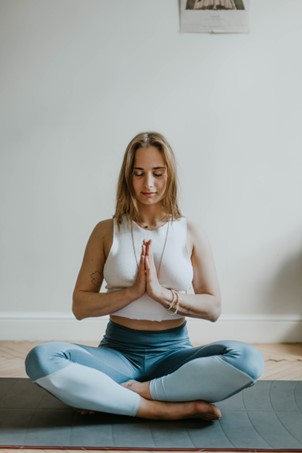Relaxation exercises can be an effective way to fall asleep faster and improve sleep quality. Here are some techniques to try:

- Breathing exercises: Deep, calm breathing can help calm the mind and prepare the body for sleep. The 4-7-8 breathing technique involves inhaling deeply through the nose for four seconds, holding the breath for seven seconds, and then exhaling slowly through the mouth for eight seconds.
- Progressive muscle relaxation: This technique involves tensing and relaxing more muscle groups. Start with the feet and gradually move through the whole body up to the head. This helps reduce physical and mental tension.
- Meditation: Practicing meditation before bed can help calm the mind and reduce stress. Focusing on your breathing or repeating a mantra can help distract you from thoughts that make it difficult to fall asleep.
- Yoga: Light yoga exercises, especially those focused on stretching and relaxation, can be helpful before bedtime. Poses such as Balasana (child’s pose) and Supta Baddha Konasana (reclining butterfly pose) are especially recommended.

- Visualization: imagining a peaceful and relaxing place can help relax the mind. Concentrate on the details of your imagined setting to draw your thoughts away from the stresses of everyday life.
- Listening to relaxing music: Gentle, calm music or nature sounds can help you relax and prepare for sleep.
- Autogenic Training: This technique involves repeating quiet, calming phrases in your mind to induce a state of relaxation.
- Stretching exercises: Gentle stretching before bed can help relax muscles and prepare the body for rest. Focus on gently stretching large muscle groups.
- Mindfulness techniques: Practicing mindfulness involves focusing on the present moment and accepting your thoughts and feelings without judgment. This can help calm an active mind before bedtime.
- Reading: While not technically a relaxation exercise, reading a book before bed can be an effective way to relax the mind.
- Tai Chi or Qi Gong exercises: These gentle forms of exercise focus on fluid movements and deep breathing, and can help reduce stress and promote relaxation.
- Aromatherapy: Using essential oils, such as lavender or chamomile, during evening relaxation rituals can create a peaceful environment conducive to sleep.

- Yoga Ball Exercises: Gentle exercises on a yoga ball, focusing on balance and stability, can help relax the muscles and mind.
- Exercise with breathing techniques: Combining physical exercise with deep breathing, such as some forms of yoga or Pilates, can be particularly effective in preparing the body and mind for sleep.
- Listening to guided meditations or bedtime stories: There are apps and podcasts that offer guided meditations or relaxing stories that can help the mind shut down and prepare for sleep.
- Performing ‘inversion’ exercises in yoga: Poses such as ‘Legs Up the Wall’ (Viparita Karani) can help relax the legs and back, as well as calm the mind.
- Exercising with a partner* Practicing simple relaxation exercises with a partner, such as massage or helping each other stretch, can build a sense of closeness and promote relaxation.
- Practice ‘mindful’ walking: A short, leisurely walk before bed, with a focus on mindful step and breathing, can help clear the mind of the day’s tensions.
- Body visualization techniques: Imagining more parts of the body and consciously relaxing them can be helpful in achieving a deep state of relaxation.
- Practice gratitude or reflection: Spending a few minutes reflecting on the positive aspects of the day or expressing gratitude can have a calming effect on the mind, promoting better sleep.
Remember that regularity is key.
Practicing these exercises as part of your evening routine can help you create healthy sleep habits and improve the overall quality of your rest.
